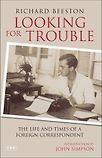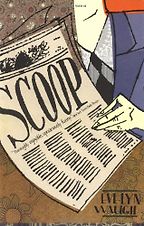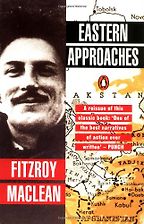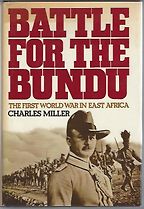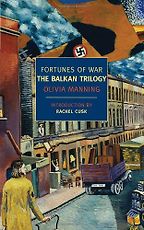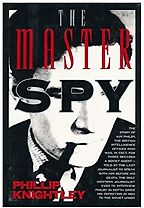Your first book is Evelyn Waugh’s Scoop. Could this be the handbook for a budding foreign correspondent?
I think it is the best description of a foreign correspondent’s career, and I doubt it will ever be bettered. It’s still very relevant to this rather ridiculous life. When I was covering the early days of the Congo, a group of us were there, maybe five or six correspondents, and somebody had a battered copy of Scoop that we passed around. It just read straight – the life we were living was hardly exaggerated.
Waugh had a history in journalism, didn’t he?
Yes, although he wasn’t himself a particularly good correspondent. Though his experience is why the book felt so real and believable. He went first to Ethiopia for the coronation of Haile Selassie and was then sent back to cover the Abyssinian war.
Did Waugh model William Boot, aka ‘Boot of the Beast’, on anyone in particular?
My editor at the Telegraph, Bill Deedes, had been a very young correspondent, 22, for The Morning Post. When he was sent out to Abyssinia he arrived at the railway station with an amazing amount of equipment – weighing 600lb. It’s that naivety, this theme of the innocent abroad, in the book. Of course Bill Deedes has always fended off suggestions that he was the inspiration for William Boot, but the ‘Beast’ was the Daily Express.
Is there much contempt from Waugh towards the characters?
I don’t think it’s contempt, but he has this fantastic ability for satire. I don’t think he ever wanted to be a foreign correspondent in particular but somehow he managed to sum up the thing in a brilliant manner.
One rather humorous character, a maverick correspondent called Wenlock Jakes, could write stories without being there. Waugh writes, ‘Jakes went out to cover a revolution in one of the Balkan capitals. He overslept in his carriage, woke up in the wrong station…went straight to a hotel and cabled off a thousand word story about barricades in the streets, flaming churches… They were pretty surprised getting a story like that.’
Was this common practice?
There was a famous occasion when the Dalai Lama was on the run from the Chinese, and a group of journalists, including a Daily Mail correspondent, rented a plane. They flew as far as the Indian Tibetan front and were turned back by the Indian air force. Everybody was very depressed that they couldn’t get a story but this Daily Mail man wasn’t worried. He said, ‘It’s all right I’ve already written mine. I’ve seen the Dalai Lama on horseback, threading through the valleys. In the background you could see the temples ablaze.’ He’d written the whole thing before he’d even taken off!
Your second book is Eastern Approaches by Fitzroy Maclean.
Maclean was one of the great characters of the 20th century. He was a junior diplomat in Moscow in the late 30s and then went on to join the SAS. During the war he kidnapped a Persian general who had collaborated with the Nazis. He was also a friend of Ian Fleming and partly an inspiration for the James Bond character. His account of the Soviet Union in the 30s was quite brilliant. A lot of journalists in those days were making excuses for communism, suggesting it was a hope for the future and were putting the best possible spin on it. But his account showed the whole hopelessness of the Soviet empire – its incompetence and its evilness. He did a brilliant account of the great Stalin purge trials.
The mock trials?
Yes, when most of the leading communists of the day were destroyed by Stalin. That whole bleak period was brilliantly described by Maclean. He showed up the hollowness and incompetence of the whole Soviet system. This is a very carefully worded account of life in those early days after the revolution, one of the first exposés of that system. He tells one particular story when he was a young diplomat. He went to a cocktail party and had a relationship with a young Russian ballet dancer who then disappeared. He had a phone call from her mother saying she’d disappeared and that she’d never forgive him. Chilling. I met him when I was correspondent in Moscow; he was then in his late 70s and he was still writing and taking pictures.
The Battle of the Bundu covers a more forgotten chapter of history. Could you shed some light on it?
Miller’s book is the most accurate and detailed account of this little known part of the First World War. A fascinating epic about an amazing German general, von Lettow-Vorbeck. He was in his early 40s when he arrived in what is now Tanzania, in those days German East Africa. It’s an account of his campaign against the Allies, which lasted throughout the entire war. In fact he was still fighting after the armistice, because no one was able to get through to him there.
Against some serious odds?
Against amazing odds! There was no way to get reinforcements or supplies; he was surrounded by British East Africa, the Congo and the Royal Navy. With a small force of German officers and loyal native troops he managed to hold up something like a quarter of a million Allied forces. He became a hero, not only of the Germans but of the British. There was little chance of Germany being able to communicate with him, but as he got more promotions and iron crosses the British would pass this through the lines to let him know how well he was doing. It was the most extraordinary campaign.
Why has this been forgotten?
There was just so much going on. This was very much a small affair, compared to what was happening – it rather got ignored. He certainly became a famous name to all the British and South Africans who fought him. In fact in 1929 he was invited to London as a guest of honour at an anniversary dinner for British East Africa expeditionary forces. In the 30s, Hitler wanted to appoint him as German ambassador to Britain. But he decided that the Nazis were a disaster and he turned Hitler down. He was then on their blacklist and had a very hard time of it. But after that war, in 1953, he came back, aged 83 years old, to be welcomed by the British authorities and met some of his old comrades. It’s very touching.
There is that old adage that reporters are reporting history as it happens. Historians then can play catch up. Do you think this account makes up for the lack of reportage at the time?
I suppose it does. It wasn’t a campaign that was covered by journalists at all. So instead of that it is a book that gives a very clear account of a very remarkable campaign.
Your fourth choice is a trilogy of books by Olivia Manning.
I think she was one of the very best novelists of the 20th century. These books, The Balkan Trilogy—and The Levant Trilogy—were her best pieces. What I found fascinating was all the drama of the Second World War in rather peripheral places. The drama and the feeling of the war were written against a background of a young couple who had just got married and who were very different in their outlook on life, and the problems of their marriage.
It’s been described as a tragicomedy.
Yes, she manages somehow to create what the wartime situation was. The British Council are portrayed as awful self-interested characters, hardly interested in the war itself. The couple are always picking up these helpless characters too, these stray cats of people and helping them along.
How is the business of war reportage portrayed here?
She gets various jobs, putting out British information. There are a lot of reporters that pass through, rather like the reporters in Scoop. She takes a rather critical view of most people though; she’s not very kind, very objective. From time to time she’s emotionally involved with people, whereas Guy Pringle, the husband, is a hopeless bundle of love and left-wing sympathies.
Finally we have The Master Spy, about the notorious third man, Kim Philby.
That’s a biography really. Knightley says he’s the only Western journalist to interview Philby in depth after his defection to the Soviet Union in 1963. He seems to have got closer to Philby than anyone else.
For the uninitiated, who was Philby?
Philby was probably the most successful spy the Soviet Union has ever had. Not only was he working for the Secret Intelligence Service, he was actually working for the section that dealt with operations against the Soviet Union. So he knew all the British spies and was able to communicate directly with the Soviets. When Burgess and Maclean, the Cambridge spies, defected to Russia the press came up with the allegation that Philby was the third man who tipped them off. So that’s how he got his title. He was the most formidable of the spies, perhaps in the Western world. The damage he did to British intelligence was amazing.
I knew Philby quite well. I was then the Middle East correspondent for the News Chronicle in Beirut. He arrived as the Observer correspondent after he had successfully denied the accusation that he was the third man.
Was he free of suspicion?
The SIS were not convinced he was a spy and were rather protective of him, but the CIA said if he remained in secret service they would not cooperate anymore with the British. So they were forced to sack him. But they themselves were not convinced that he was. So Philby was doing a little bit of espionage on the side. I think the men in charge of the station in Beirut suspected he was guilty.
You were close.
I became a good friend of his, our children went to the same school, we covered stories together.
After the first accusations fell, one dropped one’s suspicions about him and just accepted him as a friend and colleague. So when I was in Yemen and I heard the news that he had disappeared I couldn’t believe he’d gone off to Moscow – I thought someone had knocked him on the head.
Too close to see the whole picture?
Yes. I found him extraordinarily charming. After he defected, no one had heard of him for 15 years, and I happened to meet him at the Bolshoi, when I was the Moscow correspondent for the Telegraph. He was delighted to meet me and my wife because he wasn’t responsible for it, it was a chance meeting and he couldn’t get into any trouble. It was like meeting an old friend again.
Does Knightley give a fair and balanced account of Philby?
Yes, very. He goes through the Cambridge spy ring. I think quite a few of these Cambridge undergraduates were genuinely idealistic about things. The book describes him as ‘an establishment figure who betrayed the West, who decided to go against his class and his upbringing for what he believed to be the best and impeccable motives. And then spent most of his life cultivating two sides of his head.’ He had the most extraordinary double life. It’s a detailed account of his life and tries to explain his motives, which is hard to do.
How does Knightley go about painting those motives?
It was the political climate of the time; we were appeasing the fascists. He claimed in an interview: ‘I betrayed no one: I’ve always had the same employer (the Russians) and the same opinions, I was a straight penetration agent.’ I had a feeling he got a strange pleasure from betraying people, having a secret they didn’t know about. There was that element to him.
December 5, 2012. Updated: February 16, 2025
Five Books aims to keep its book recommendations and interviews up to date. If you are the interviewee and would like to update your choice of books (or even just what you say about them) please email us at [email protected]
Five Books interviews are expensive to produce. If you've enjoyed this interview, please support us by donating a small amount.

